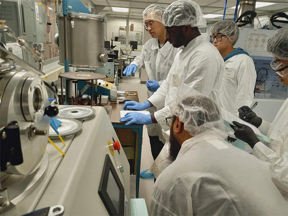Home > Press > Multi-institution, $4.6 million NSF grant to fund nanotechnology training
 |
| Penn State is one of the recipients of a four-year, $4.6 million, multi-institution grant from the National Science Foundation to provide microelectronics and nanomanufacturing training to military service members and veterans.
CREDIT CNEU |
Abstract:
The Center for Nanotechnology Education and Utilization (CNEU) in the Department of Engineering Science and Mechanics at Penn State was named as one of the recipients of a four-year, $4.6 million, multi-institution grant from the National Science Foundation (NSF) to provide microelectronics and nanomanufacturing training to military service members and veterans. The Penn State share of the grant is close to $2 million to focus on the continued development of courses and curriculum programs for the training.
Multi-institution, $4.6 million NSF grant to fund nanotechnology training
University Park, PA | Posted on September 9th, 2022
The global nanomanufacturing-based market and labor needs are estimated to double every three years, according to a report by Eightfold AI. To meet the worldwide demand for critical semiconductor applications alone, the U.S. needs to add about 5.5% of the global production. This amounts to approximately 20 fabrication plants and 70,000-90,000 total fabrication jobs.
To meet this opportunity, the U.S. needs to increase its current skilled workforce by 50%, but very few fully equipped training programs exist today, said Osama Awadelkarim, UNESCO Chair, professor of engineering science and mechanics and CNEU director at Penn State. This grant will support a consortium of nine academic institutions and eight industries to provide classroom studies and hands-on training that meet the unique needs of military service members and veteran students, whether they are looking to advance within the armed forces or transition into the civilian sector.
The NSF grant was awarded less than two weeks before President Joe Biden signed the $280 billion CHIPS and Science Act to support domestic semiconductor manufacturing capabilities and increase research development in the sector. An integrated circuit, sometimes called a chip, is an assembly of billions of tiny electronic devices fabricated and interconnected on a small semiconductor material surface.
The military offers a large pool of candidates for this training. According to Awadelkarim, many already have experience in the advanced technology industry, and others possess in-demand leadership qualities that make them exceptional candidates for technical positions in the civilian workforce.
The CNEU will lead the consortium with a core of four community colleges that are located near military bases, including Tidewater Community College (TCC) in Norfolk, Virginia, Southwestern College in San Diego, Rio Salado College in Tempe, Arizona, and Georgia Piedmont Technical College in Atlanta.
The community colleges will recruit students for each 12-week course, which includes remote classes in the mornings and skills training in the afternoons. Upon successful completion, students can sit for ASTM International (formerly known as American Society for Testing and Materials) certification. The course, which will be offered each fall and spring semester through 2026, is expected to produce about 300 graduates.
The NSF funded the pilot Nanomanufacturing Certificate Program in spring and fall 2021. CNEU, TCC and Norfolk Southern University (NSU) delivered the program to nine Navy veterans. Six of the graduates obtained ASTM International certificates, four of whom are currently working for nanomanufacturing companies and two of whom are now pursuing bachelors degrees in engineering.
University partners joining Penn State and NSU in the nationwide rollout are University of California San Diego, Georgia Institute of Technology and Arizona State University. The universities will share resources, facilities and virtual instrumentation with their nearby community colleges.
Awadelkarim anticipates active engagement and support from the consortiums industry partners SEMI North America, Taiwan Semiconductor Manufacturing Company, Global Foundries, MICRON Technology, Tokyo Electron, Qorvo, Wolfspeed and Universal Display Corporation via hands-on training, webinars and human resources mentoring.
Low awareness of nanomanufacturing and microelectronics processing careers has hindered enrollment across training programs at all levels, especially at the associate degree level, Awadelkarim said. The partnerships among the industries, community colleges and universities which include curricula and best-practices sharing, coordination among programs and new approaches to creating workforce training will begin to address these issues.
####
For more information, please click here
Contacts:
Adrienne Berard
Penn State
Copyright © Penn State
If you have a comment, please Contact us.
Issuers of news releases, not 7th Wave, Inc. or Nanotechnology Now, are solely responsible for the accuracy of the content.
News and information
![]()
Modified microwave oven cooks up next-gen semiconductors September 9th, 2022
![]()
New catalyst offers a more affordable way to produce hydrogen from seawater September 9th, 2022
Govt.-Legislation/Regulation/Funding/Policy
![]()
New cathode design solves major barrier to better lithium-ion batteries September 9th, 2022
![]()
Understanding outsize role of nanopores: New research reveals differences in pH, and more, about these previously mysterious environments August 26th, 2022
Possible Futures
![]()
Modified microwave oven cooks up next-gen semiconductors September 9th, 2022
![]()
New road towards spin-polarised currents September 9th, 2022
![]()
Lattice distortion of perovskite quantum dots induces coherent quantum beating September 9th, 2022
Academic/Education
![]()
Lifeboat Foundation Guardian Winner Jeff Bezos Donates One Million to Lifeboat Foundation Dream Project Winner Teachers in Space July 30th, 2021
![]()
NSF renews Rice-based NEWT Center for water treatment: Partnership primed to introduce game-changing technologies to address global needs October 15th, 2020
Announcements
![]()
Modified microwave oven cooks up next-gen semiconductors September 9th, 2022
![]()
New catalyst offers a more affordable way to produce hydrogen from seawater September 9th, 2022
Grants/Sponsored Research/Awards/Scholarships/Gifts/Contests/Honors/Records
![]()
Understanding outsize role of nanopores: New research reveals differences in pH, and more, about these previously mysterious environments August 26th, 2022
![]()
New chip ramps up AI computing efficiency August 19th, 2022
![]()
UNC Charlotte-led team invents new anticoagulant platform, offering hope for advances for heart surgery, dialysis, other procedures July 15th, 2022










